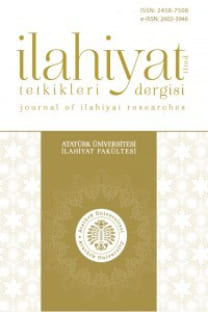EBÛ BEKR İBN EBÎ ŞEYBE VE BUHÂRÎ İLE İLİŞKİSİ / Abu Bakr Ibn Abi Shayba and his Relation with Bukhari
ÖZET 159-235/775-849 yılları arasında yaşamış olan İbn Ebî Şeybe, yüzlerce sahâbînin gelip yerleştiği ve Resûlullah (s.a.s.)’ın sünnetini taşıdığı Kûfe ve Basra ile, zamanın en önemli ilim merkezlerinden Bağdat bölgesinde yetişen büyük muhaddislerdendir. Aynı zamanda müfessir de olan İbn Ebî Şeybe, başta hadîs olmak üzere İslâmî ilimlerin çeşitli dallarında eserler kaleme almıştır. Onun en önemli eseri, birçok nüshası günümüze gelen Musannef’idir. Konularına göre tertib edilmiş olan eser, yedi bini merfû‘ olmak üzere otuz sekiz bin civarında hadîs ihtiva etmektedir. Eser, sonraki dönemlere metot ve rivâyet açısından önemli ölçüde etki etmiştir. Anahtar Kelimeler: İbn Ebî Seybe, Musannef, Muhaddis, Buhârî. ABSTRACT Ibn Abi Shayba who lived between 775 and 849 (159 and 235 H.) was one of the famous traditionists who grew up in Baghdad, Kufa and Basra, which were important scientific centers where many friends of the Prophet had settled down and carried the tradition of the Prophet. At the same time, he was commentator of the Qur’an and wrote many books on islamic sciences, especially on hadith that is the tradition of the Prophet Muhammad. The most important and famous book belonging to him is the “Musannaf”, whose many manuscript copies have reached us. The work which was ordered according to the subjects contain 38000 traditions, 7000 of which were “marfu‘”. The book has been influential on tho works written in later periods both methodologically and narratively. Key Words: Ibn Abi Shayba, Musannaf, Muhaddith, Bukhari.
Anahtar Kelimeler:
-
- ISSN: 2458-7508
- Yayın Aralığı: 2
- Başlangıç: 1975
- Yayıncı: Atatürk Üniversitesi
